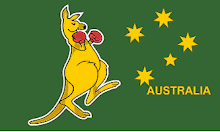
As an amateur family historian for the past 19 years, I have watched with interest the tv show, 'Who Do You Think You Are?' After reading your recent article however, one thing does beg to be said - that you don't need to be famous to have remarkable ancestors. Certainly not all of us can lay claim to a famous ancestor (one of the first Port Phillip settlers is about all I could find in my tree!) but many of us are descended from people who faced hardships and uncertain futures through immigration to this country (be it convict or otherwise) or through watching strangers inhabit tribal lands. The environment that these people found themselves in and the struggles that they faced on a day-to-day basis make the investigation into each of their personal histories a privilege that never ceases to surprise and amaze me.
I very rarely write letters to newspapers etc, but after reading this article, I decided to write the above to the editor of the paper.
I love the show, "Who Do You Think You Are?" (Sunday nights at 7.30 on SBS). It is so interesting. I watched the first Australian episode with Jack Thompson last night and was riveted, not only by his hugely emotional journey, but by the sheer content of Australian history in his search.
But it is true. Incredible ancestral feats are in no way limited to famous people. I know from my own research that we all have some amazing, resilient people in our lineage - it's just a matter of learning about them.
Like Matthew Carter, William Rollan, William Jenkins and Eliza Tully who all came here in shackles as convicts from an unfair British system. They stole wheat, linen, a harness and a gown respectively. They were petty criminals who survived a sickeningly long journey only to come here and have to work for their freedom. 'Australian royalty' is what Jack Thompson referred to them as in his feature show last night - the essence of what the European descendants in this country came from.
Like Susan/Maria Ellis/Cook, the aboriginal partner of William Rollan who bore him five children and created a long line of descendants. Her aboriginal name may never be known and her story will remain greatly untold thanks to the limited paperwork surrounding such a union. But one has to wonder what type of racism she(and he for that matter) met with on a day-to-day basis.
Like Thomas Atkinson, who came to this country in search of gold. It must have shocked him on arrival that gold was a commodity not so easily come by. His quest for riches through hard and dirty work no doubt left his body in a such a state that he died at such a young age, leaving his children with no parents and an uncertain future life of orphanage dwelling.
Like Thomas Tennyson and Agnes McNally who, so the story goes, fell in love despite their difference in class and fortune, leaving Agnes' family so furious that they were banished from their home town and ended up in Queensland with their young family. So much turmoil and despair was faced that Thomas suffered severe depression and his wife ended up raising their children alone after he was hospitalised and subsequently died in an asylum.
Like Michael James Hinde who came to Australia in search of a better life. He became one of the very first pioneers of the Gilston area, as I described here and established himself and his family as important and respectable people of the area due to his hard work at toiling his newly acquired lands.
And finally, like James and Mary Gilbert who were two of the first people on the ship Enterprize that first landed in Port Phillip Bay to establish a new colony for the ever-expanding east coast. Mary, in particular, is remarkable in that she was pregnant on the journey and subsequently gave birth to the first white child born in Melbourne (my great great great grandfather's brother) and whose story has been immortalised in Fawkner's journals of the event. Sadly, the history books lost touch with them after that and it is only persistent research and help from other researchers and historians that has led me back to them and their story in my still unfolding research.
Family history research is not cheap nor is it quick, but learning about who you are where you did come from can be one of the most fascinating journeys to undertake.


